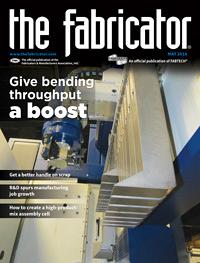Senior Editor
- FMA
- The Fabricator
- FABTECH
- Canadian Metalworking
Categories
- Additive Manufacturing
- Aluminum Welding
- Arc Welding
- Assembly and Joining
- Automation and Robotics
- Bending and Forming
- Consumables
- Cutting and Weld Prep
- Electric Vehicles
- En Español
- Finishing
- Hydroforming
- Laser Cutting
- Laser Welding
- Machining
- Manufacturing Software
- Materials Handling
- Metals/Materials
- Oxyfuel Cutting
- Plasma Cutting
- Power Tools
- Punching and Other Holemaking
- Roll Forming
- Safety
- Sawing
- Shearing
- Shop Management
- Testing and Measuring
- Tube and Pipe Fabrication
- Tube and Pipe Production
- Waterjet Cutting
Industry Directory
Webcasts
Podcasts
FAB 40
Advertise
Subscribe
Account Login
Search
Tennessee metal manufacturer ramps up research
Government program links national labs with industry
- By Tim Heston
- April 27, 2016
- Article
- Shop Management

Figure 1
Metal manufacturer MECO is owned by Unaka Co., a holding company named after the nearby ridge of mountains.
Mark Proffitt visited the White House last year to accept an award. The president of MECO, a 125-employee metal manufacturer in Greeneville, amid the hills of eastern Tennessee, accepted a $125,000 voucher for innovation and product development as part of a new program—RevV!, the Tennessee Manufacturing Innovation Program—which was created by the state of Tennessee in partnership with the University of Tennessee and the Department of Energy’s Oak Ridge National Laboratory.
Proffitt also participated in the Forum on Connecting Regional Innovation Ecosystems to Federal and National Labs. Forum guests included lab directors, university leaders, federal agency administrators, and other business executives. The thrust of all this was economic development.
Proffitt put it in plain language: “It was about creating jobs.”
MECO and its parent company, Unaka Co., have experience with this. Its story follows the narrative of Greene County, a one-time hub for tobacco processing that transformed into a center for manufacturing and logistics.
The story isn’t without its challenges. Globalization hit MECO and companies in the surrounding area like it did everywhere else. But it’s a story centered on a refreshing focus on what really matters: community—a thing not taken for granted in rural Appalachia, where many communities suffered or were lost entirely over the years.
How do you build, or rebuild, a community? You need jobs. How do you create jobs? You discover a market need. That need could be met with a manufacturing job; by an engineering job creating a new technology that may disrupt a market; or by a job managing a warehouse holding various manufactured products, some imported from China. MECO now has all of the above.
Jobs for the Community
Almost 60 years ago the Austin family saw change on the horizon in eastern Tennessee. As Proffitt explained, “They traded tobacco, back in the day when tobacco was big. They bought tobacco from all over the world, brought it here [to Greene County] to process, convert, and sell.”
One of the company founders saw a need for economic development. Tobacco was good business, but it was just one business. To thrive, Proffitt said, the area really needed more business diversity. “So he asked, ‘What can we do to facilitate employment in Greeneville?’”
This question eventually led the family to launch Unaka Co., a holding company named after the nearby ridge of mountains, in 1950 (see Figure 1). Today the organization owns a food packaging company; a distribution company; a foods commodity trader; a management company of executive apartments and conference rooms; and MECO. The company is still owned by the Austin family; Robert Carter Austin, son of one of the founders, is the current chairman and CEO (see Figure 2).
The organization has the feel of a private, regional, pre-GEICO Berkshire-Hathaway, a group of disparate companies that provide needed products and services most people don’t think much about. All the same, without Unaka, Greene County probably would be a very different place.

Figure 2
MECO President Mark Proffitt (left) and John Evans, sales manager for the company’s contract manufacturing division, stand by a photo of company founder Robert Austin Sr.
Two Sides of the Business
Launched in 1959, MECO itself is a hybrid. “Our business is split into two parts,” Proffitt said. “We have one focus on retail, and then another focus on contract manufacturing.”
On the retail side, MECO makes some products in-house while outsourcing others. It sells folding furniture, both steel and wood, most of which is manufactured in China and Vietnam. It also sells barbecue grills, which it manufactures in its Greene-ville facility.
“We’re practically the only barbecue grill manufacturer that’s still in the U.S. manufacturing products at this scale,” Proffitt said. He added that for some barbecue products, 100 percent of their components come from the U.S., while others use a blend of outsourced and in-house components.
“Part of the research project we’re involved with is aimed at getting all of this manufacturing back to the United States. That’s the driving force behind it.”
Another business is contract manufacturing, which takes the capabilities MECO uses for its product lines—stamping (including deep drawing), machining, press brake bending, welding, powder coating, assembly, packaging, and warehousing and distribution—and sells them to other companies (see Figures 3-5).
As John Evans, MECO’s sales manager for contract manufacturing, put it: “The greater combination of processes we do, the more value we provide, and the more we can integrate ourselves with our customers.”
Contract manufacturing goes back to MECO’s roots. In its early years the company made most of its money from contract work, making TV chassis, boat trailers, canteen cups, and more. Through government relationships built in the food business, the founders landed some of MECO’s first contracts: stamping, welding, and assembling bomb fins for the military.
During the early years the founders looked ahead and saw a trend. The way people shopped was changing; mom-and-pops were being replaced or consolidated into mass retailers, and those retailers needed manufacturing support.
From this came MECO’s foray into furniture manufacturing. It purchased a product line, along with the tools that made it, and began producing metal furniture from the Greeneville plant.
“We ended up in the grill business in a similar way,” Proffitt said. “We looked out in the world to see what other product lines were available. We then bought a grill product line and developed it into what it is today.” MECO purchased the product line before the Olympics were held in Australia in 2000, which in turn inspired the name: Aussie Grills.
Effects of Globalization
Today employees at the MECO plant still stamp, powder coat, bend, and assemble the components for the Aussie Grill. But a portion of MECO’s 600,000-square-foot campus is dedicated to distribution. The warehouse has rows of boxes having the familiar “Made in China” label on the front. What happened?
“It’s the stereotypical U.S. manufacturing story,” Proffitt said. “What comes after you say that? China. When you have the Chinese government subsidizing steel and subsidizing their manufacturing, then it’s an unlevel playing field. I’m buying on both sides of the field. I know what I can pay for steel in China, and I know what I pay for steel here. It’s a vast difference. That’s a commodity item, and it should not be a vast difference. Starting about 15 years ago, it just wasn’t profitable for us to manufacture folding metal furniture in the U.S. anymore.”
MECO filed an antidumping suit against Chinese manufacturers that were selling products in the U.S. below cost. “We won the case, and we attempted to keep some of that manufacturing here,” Proffitt recalled. “Still, the price retailers were paying for furniture, even with the duty [put in place as a result of the suit], continued to be lower than our cost to manufacture. So eventually we had to buy that product from China as well.”
Proffitt added that every year MECO re-evaluates whether it can bring some of its furniture manufacturing business back to the states. Regardless, over the years the company focused on growing its retail business, both by continuing to contract furniture products overseas and by growing the grill product lines it manufactures in Greeneville.
The Potential of R&D
In recent years the growth on the retail side dovetailed into more opportunity for the contract manufacturing side. Contract customers would visit the plant with a certain problem; they then looked around and saw the range of services MECO offered, from stamping to packaging, warehousing, and distribution.
“As this business has always done,” Evans said, “where there’s an opportunity, we follow it. So in addition to focusing on our product lines, we began to put more emphasis on contract manufacturing.”
The diversification strategy isn’t unusual, but Proffitt added that the strategy goes a bit deeper than just having a range of revenue streams from different sectors of the economy. At the core of the issue is commoditization. A company can have any number of different customers from disparate industries. But what if most of those products or services are commodities—meaning it wouldn’t take lot of effort for customers to take their business elsewhere? If this were the case, the company still may not be financially secure.
As managers saw it, MECO can avoid commoditization in two ways. The first comes through tight integration with its contract manufacturing customers. The more processes MECO can take on, the more value it can provide to customers.
The second is through new technology. This is where the company’s R&D efforts fit into the picture, and it’s why the company participates in Tennessee’s RevV! voucher program, which in essence helps small and medium-sized companies like MECO get access to the facilities and expertise at government labs, including the well-known lab in Oak Ridge.
Resources include not only the physical testing equipment, but also the lab’s knowledge base that includes current technical talent as well as an extensive database of past research. The idea is to connect the country’s research institutions with the small and medium-sized businesses that otherwise couldn’t afford them. This is a big deal, considering that, according to Census data from 2012, almost 90 percent of all employers in the U.S. have fewer than 20 employees.

Figure 4
MECO’s powder coat booths are on tracks. To perform a quick color change and keep production flowing, technicians simply swap out entire booths.
As Proffitt put it, “They take your research project, and they point you either to technology that already exists, or technology that is being developed that would solve your problem.”
When Proffitt took over as MECO’s president in 2012, he organized several management teams to focus on cost improvement, quality, and overall business development. As Proffitt described, “The teams have been challenged to think about how we evolve this business. What resources are out there that we can take advantage of? And one of the resources we found was the RevV! voucher program.”
The research projects are in early stages, so Proffitt said he couldn’t reveal much. But he did say that they may produce a process that would be “disruptive” in several markets that MECO serves, including grills.
“This could bring new work into the plant that would improve our competitiveness in the grill market,” Proffitt said. He added that a few grill parts are still sourced overseas, and that this research project has the potential of bringing those few grill parts that are outsourced back to the U.S.
In effect, the company is looking to develop technology that has the potential to disrupt certain markets, and it wants to develop it before the competition does. The last thing any manufacturer wants, and especially one with a large product line, is for a competitor to disrupt the market first.
As Evans explained, “That’s why we’re trying to identify what we can do that would be a disruptive change for everyone else. We don’t want to have someone disrupt the market first, and all of a sudden, for whatever reason, we just can’t compete. We don’t want to be outflanked. We’re just thinking about where those possible disruptions come from, and we’re asking, ‘Could we get our arms around those first?’”
Could this research project, if successful, bring the company’s furniture manufacturing stateside? Not immediately. “This new project would help a little, perhaps change the [furniture] cost equation by about 10 percent,” Proffitt said. “But for certain markets in our contract manufacturing and for our grill business, it will be a true disrupter to the market.”
Proffitt paused. “There’s a big ‘if’ here—if we’re successful in the development.”
In R&D, there’s always a big “if.” But at this writing, both Evans and Proffitt said they’re optimistic. Ideally, this research could lead to more success, more jobs, and a growing community, all of which harks back to why MECO was launched in the first place.
For more information on the RevV! program, visit www.ornl.gov/programs/revv.
MECO, a Unaka Company, 800-251-7558, www.mecomanufacturing.com, www.aussiegrills.com
About the Author

Tim Heston
2135 Point Blvd
Elgin, IL 60123
815-381-1314
Tim Heston, The Fabricator's senior editor, has covered the metal fabrication industry since 1998, starting his career at the American Welding Society's Welding Journal. Since then he has covered the full range of metal fabrication processes, from stamping, bending, and cutting to grinding and polishing. He joined The Fabricator's staff in October 2007.
subscribe now

The Fabricator is North America's leading magazine for the metal forming and fabricating industry. The magazine delivers the news, technical articles, and case histories that enable fabricators to do their jobs more efficiently. The Fabricator has served the industry since 1970.
start your free subscription- Stay connected from anywhere

Easily access valuable industry resources now with full access to the digital edition of The Fabricator.

Easily access valuable industry resources now with full access to the digital edition of The Welder.

Easily access valuable industry resources now with full access to the digital edition of The Tube and Pipe Journal.
- Podcasting
- Podcast:
- The Fabricator Podcast
- Published:
- 04/30/2024
- Running Time:
- 53:00
Seth Feldman of Iowa-based Wertzbaugher Services joins The Fabricator Podcast to offer his take as a Gen Zer...
- Industry Events
Pipe and Tube Conference
- May 21 - 22, 2024
- Omaha, NE
World-Class Roll Forming Workshop
- June 5 - 6, 2024
- Louisville, KY
Advanced Laser Application Workshop
- June 25 - 27, 2024
- Novi, MI
Precision Press Brake Certificate Course
- July 31 - August 1, 2024
- Elgin,

































